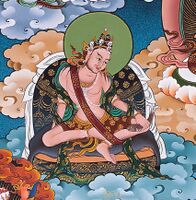| bio
|
Tilopa. (T. Ti lo pa) (988–1069). An Indian tantric adept counted among the eighty-four mahāsiddhas and venerated in Tibet as an important source of tantric instruction and a founder of the Bka' brgyud sect. Little historical information exists regarding Tilopa's life. According to his traditional biographies, Tilopa was born a brāhmaṇa in northeast India. As a young man he took the vows of a Buddhist monk, but later was compelled by the prophecies of a ḍākinī messenger to study with a host of tantric masters. He lived as a wandering yogin, practicing tantra in secret while outwardly leading a life of transgressive behavior. For many years Tilopa acted as the servant for the prostitute Barima (in truth a wisdom ḍākinī in disguise) by night while grinding sesame seeds for oil by day. The name Tilopa, literally "Sesame Man," derives from the Sanskrit word for sesamum. Finally, Tilopa is said to have received instructions in the form of a direct transmission from the primordial buddha Vajradhara. Tilopa instructed numerous disciples, including the renowned Bengali master Nāropa, who is said to have abandoned his prestigious monastic position to become Tilopa's disciple, undergoing many difficult trials before receiving his teachings. Those teachings were later received by Marpa Chos kyi blo gros, who brought Tilopa's teachings to Tibet. As with many Indian siddhas, Tilopa's main instructions are found in the form of dohā, or songs of realization. Many of his songs, together with several tantric commentaries and liturgical texts, are included in the Tibetan canon. Among the teachings attributed to him are the bka’ ’babs bzhi ("four transmissions"), the lus med mkha’ ’gro snyan rgyud chos skor dgu ("nine aural lineage cycles of the formless ḍākinīs"), and the Mahāmudropadeśa. (Source: "Tilopa." In The Princeton Dictionary of Buddhism, 914. Princeton University Press, 2014. http://www.jstor.org/stable/j.ctt46n41q.27.)
|
